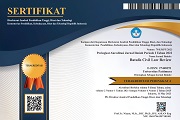Comparative Analysis of Legal Policies Regarding Force Major During Covid-19 Pandemic in Indonesia and China
 ), Mohamad Hidayat Muhtar(2), Nabih Amer(3)
), Mohamad Hidayat Muhtar(2), Nabih Amer(3)
(1) Faculty of Law Negeri Gorontalo University, Gorontalo, Indonesia

(2) Faculty of Law Negeri Gorontalo University, Gorontalo, Indonesia
(3) Faculty of Law Negeri Gorontalo University, Gorontalo, Indonesia
 Corresponding Author
Corresponding Author
Abstract
Keywords
DOI
10.47268/ballrev.v3i1.721
Published
2022-05-16
How To Cite
@article{BALLREV721,
author = {Dolot Bakung and Mohamad Muhtar and Nabih Amer},
title = {Comparative Analysis of Legal Policies Regarding Force Major During Covid-19 Pandemic in Indonesia and China},
journal = {Batulis Civil Law Review},
volume = {3},
number = {1},
year = {2022},
keywords = {Covid-19; Force Majeure; Indonesia; China},
abstract = {Covid-19 as a pandemic in the 20th century has brought consequences in many aspects, one of which is the force major aspect. The force majeure policy in Indonesia is still incomplete, unlike China, which already has a more complete policy. The purpose of the research is to be able to find out about the Covid-19 policy in Indonesia and to compare the Indonesian and Chinese force major policy settings. The research method uses a normative research type with a statutory approach. The results of the study show that Indonesia's policy in dealing with covid 19 has problems in two policies, namely: the provision of information and the Lockdown policy. Meanwhile, the comparison problem with China is better by providing a mechanism with more legal certainty, namely providing access to the determination of force major against the Supreme Court, while Indonesia does not have a similar mechanism.},
issn = {2746-8151}, pages = {8--18} doi = {10.47268/ballrev.v3i1.721},
url = {https://fhukum.unpatti.ac.id/jurnal/ballrev/article/view/721}
}
Adhari, A. (2019). Ambiguitas Pengaturan Keadaan Bahaya Dalam Sistem Ketatanegaraan Indonesia. Dialogia Iuridica: Jurnal Hukum Bisnis Dan Investasi, 11(1), 43–61. https://doi.org/10.28932/di.v11i1.1960
Adonara, F. F. (2014). Aspek-Aspek Hukum Perikatan. Mandar Maju.
Andrianti, W. P., Santoso, B., & Prasetyo, M. H. (2021). Pandemi Covid-19 Sebagai Justifikasi Force Majeure dalam Kontrak Bisnis. NOTARIUS, 14(2), 739–756.
Berger, K. P., & Behm, D. (2020). Force Majeure and Hardship in the Age of Corona: A Historical and Comparative Study. McGill Journal of Dispute Resolution, 6(4), 78–130. https://doi.org/10.2139/ssrn.3575869
Bramasta, D. B. (2020). Menyelisik Tugas dan Fungsi Gugus Tugas Percepatan Penanganan Covid-19 yang Dibubarkan Jokowi. KOMPAS.Com. https://www.kompas.com/tren/read/2020/07/22/124500765/menyelisik-tugas-dan-fungsi-gugus-tugas-percepatan-penanganan-covid-19-yang
Commission, E. (2018). Regulation Of The European Parliament And Of The Council: addressing situations of crisis and force majeure in the field of migration and asylum.
Grace, D. L. (2001). Force Majeure, China & (and) The CISG: Is China’s New Contract Law a Step in the Right Direction. SAN DIEGO INTERNATIONAL LAW JOURNAL, 2(1), 173–207.
Herbots, J. H. (2021). Covid-19 and contracts in China and Europe. China-EU Law Journal, 1–9. https://doi.org/10.1007/s12689-021-00091-5
Ishaq, H. (2017). Metode Penelitian Hukum. Alfabeta.
Liu, J. Y., & Bai, C. (2020). Coronavirus in the Chinese Law Context: Force Majeure and Material Adverse Change. Pillsburylaw.Com. https://www.pillsburylaw.com/en/news-and-insights/coronavirus-in-the-chinese-law-context-force-majeure-and-material-adverse-change.html
Marzuki, P. M. (2016). Penelitian Hukum,. Kencana.
Miru, A. (2016). Hukum Perikatan: Penjelasan Makna Pasal 1233 sampai 1456 BW. Raja Grafindo Persada.
Sukarmi. (2008). Cyber Law: Kontrak Elektronik Dalam Bayang-Bayang Pelaku Usaha. Pusaka Sastra.
Tuwu, D., Laksmono, B. S., Huraerah, A., & Harjudin, L. O. (2021). Dinamika Kebijakan Penanganan Pandemi COVID-19 Dalam Perspektif Kesejahteraan Sosial. SOSIO KONSEPSIA: Jurnal Penelitian Dan Pengembangan Kesejahteraan Sosial, 10(2), 97–110. https://doi.org/10.33007/ska.v10i2.2158
Cited-By:
1. Termination of the contract by the breaching party in Civil Code of China
JingFei Qi, Bolot Toktobaev, Qian Zhang
Social Legal Studios vol: 6 issue: 4 first page: 183 year: 2023
Type: Journal [View Source]
| Dublin Core | PKP Metadata Items | Metadata for this Document | |
| 1. | Title | Title of document | Comparative Analysis of Legal Policies Regarding Force Major During Covid-19 Pandemic in Indonesia and China |
| 2. | Creator | Author's name, affiliation, country |
Dolot Al Hasni Bakung; Faculty of Law Negeri Gorontalo University, Gorontalo; Indonesia  |
| 2. | Creator | Author's name, affiliation, country | Mohamad Hidayat Muhtar; Faculty of Law Negeri Gorontalo University, Gorontalo; Indonesia |
| 2. | Creator | Author's name, affiliation, country | Nabih Amer; Faculty of Law Negeri Gorontalo University, Gorontalo; Indonesia |
| 3. | Subject | Discipline(s) | |
| 3. | Subject | Keyword(s) | Covid-19; Force Majeure; Indonesia; China |
| 4. | Description | Abstract | Covid-19 as a pandemic in the 20th century has brought consequences in many aspects, one of which is the force major aspect. The force majeure policy in Indonesia is still incomplete, unlike China, which already has a more complete policy. The purpose of the research is to be able to find out about the Covid-19 policy in Indonesia and to compare the Indonesian and Chinese force major policy settings. The research method uses a normative research type with a statutory approach. The results of the study show that Indonesia's policy in dealing with covid 19 has problems in two policies, namely: the provision of information and the Lockdown policy. Meanwhile, the comparison problem with China is better by providing a mechanism with more legal certainty, namely providing access to the determination of force major against the Supreme Court, while Indonesia does not have a similar mechanism. |
| 5. | Publisher | Organizing agency, location | Faculty of Law, Universitas Pattimura |
| 6. | Contributor | Sponsor(s) | |
| 7. | Date | (YYYY-MM-DD) | 2022-05-16 |
| 8. | Type | Status & genre | Peer-reviewed Article |
| 8. | Type | Type | |
| 9. | Format | File format | |
| 10. | Identifier | Uniform Resource Identifier | https://fhukum.unpatti.ac.id/jurnal/ballrev/article/view/721 |
| 10. | Identifier | Digital Object Identifier | 10.47268/ballrev.v3i1.721 |
| 11. | Source | Title; vol., no. (year) | Batulis Civil Law Review; Vol 3, No 1 (2022): VOLUME 3 NOMOR 1, MEI 2022 |
| 12. | Language | English=en | en |
| 13. | Relation | Supp. Files | |
| 14. | Coverage | Geo-spatial location, chronological period, research sample (gender, age, etc.) | |
| 15. | Rights | Copyright and permissions | Copyright: Authors who publish their manuscripts in this Journal agree to the following conditions: 1. The copyright in each article belongs to the author, as well as the right to patent. 2. Authors are able to enter into separate, additional contractual arrangements for the non-exclusive distribution of the journal's published version of the work (e.g., post it to an institutional repository or publish it in a book), with an acknowledgment of its initial publication in this journal. 3. Authors are permitted and encouraged to post their work online (e.g., in institutional repositories or on their website) prior to and during the submission process, as it can lead to productive exchanges, as well as earlier and greater citation of published work. 4. Authors have the right to self-archiving of the article (Author Self-Archiving Policy)
Licence : Batulis Civil Law Review Journal is disseminated based on the Creative Commons Attribution-NonCommercial 4.0 International license terms. This license allows anyone to copy and redistribute this material in any form or format, compose, modify, and make derivatives of this material for any purpose. You cannot use this material for commercial purposes. You must specify an appropriate name, include a link to the license, and certify that any changes have been made. You can do this in a way that is appropriate, but does not imply that the licensor supports you or your use.
|
Copyright (c) 2022 Dolot Al Hasni Bakung, Mohamad Hidayat Muhtar, Nabih Amer

This work is licensed under a Creative Commons Attribution-NonCommercial 4.0 International License.
Cited-By:
1. Termination of the contract by the breaching party in Civil Code of China
JingFei Qi, Bolot Toktobaev, Qian Zhang
Social Legal Studios vol: 6 issue: 4 first page: 183 year: 2023
Type: Journal [View Source]

 : 3469 times
: 3469 times Download : 1583 times
Download : 1583 times














